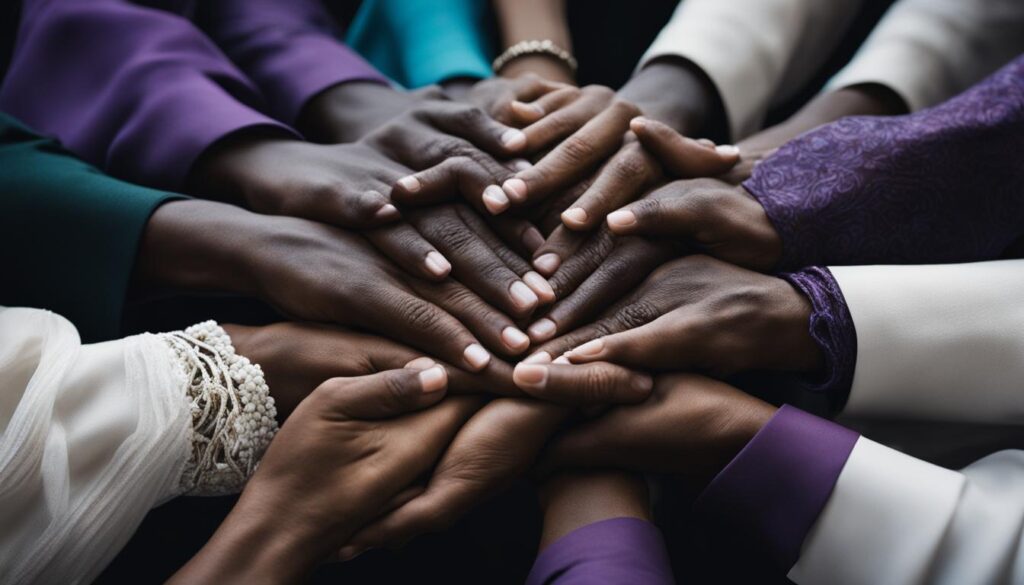We may earn money or products from the companies mentioned in this post.
Funerals are an essential part of the grieving process, honoring the deceased and providing a sense of closure for the bereaved. For many people, religious traditions and customs play a significant role in funeral services, reflecting the beliefs and values of their faith. Understanding these traditions is essential to ensure that funeral services are respectful and meaningful to those in attendance.
In this section of our guide, we will provide an overview of religious funeral rites and ceremonies. We will explore the significance of funeral rituals in various religious practices, highlighting the role they play in honoring the deceased and providing comfort to the bereaved. Through this understanding, we hope to foster cultural empathy and respect for different ways of grieving and honoring the dead.
Key Takeaways:
- Religious funeral rites and ceremonies are an important part of the grieving process for many people.
- Understanding and respecting different religious traditions is crucial when attending or planning a funeral service.
- Funeral traditions reflect the beliefs and values of different faiths.
- Religious rituals play a significant role in honoring the deceased and providing comfort to the bereaved.
- By familiarizing ourselves with these traditions, we can honor the deceased, support the bereaved, and foster cultural understanding and empathy during a time of grief.
Religious Funeral Rites and Ceremonies Across Faiths
Funeral services are an important part of religious life. They provide an opportunity to honor the deceased and comfort the bereaved. Each religion has its unique funeral customs and rituals, which reflect its beliefs and traditions.
Christianity
Christian funeral services typically take place in a church. The service may include hymns, prayers, and a eulogy. A Christian funeral usually involves a casket, and mourners may have the opportunity to view the deceased before the service. In some denominations, the casket is closed during the service. Christian funerals also celebrate the belief in resurrection and eternal life.
Islam
Islamic funeral services take place as soon as possible after death. The deceased is washed and shrouded in a plain white cloth. The service, known as Janazah, is often held in a mosque and includes a prayer, Quranic recitation, and a eulogy. Mourners may also participate in a procession to the cemetery, where the deceased is buried facing Mecca.
Judaism
Jewish funeral services are simple and solemn. The service takes place in a synagogue or funeral home and includes prayers, scripture readings, and a eulogy. The casket is usually closed, and the deceased is buried as soon as possible. Jewish funerals also require burial in a plain wooden casket and shrouded in a simple white cloth.
Hinduism
Funeral customs in Hinduism vary depending on the region and community. The deceased is traditionally cremated, and the ashes are spread in a holy body of water. The funeral service may take place in a temple or at the home. The service may include readings from Hindu scriptures and the offering of flowers, incense, and food to the gods.
Buddhism
Buddhist funeral services vary depending on the tradition and community. The service may take place in a temple or funeral home and may include chanting, readings from Buddhist scriptures, and a eulogy. The deceased may be cremated or buried, depending on local customs.
As we can see, funeral customs and rituals are unique to each religion. Understanding the differences in religious funeral traditions is crucial when attending or planning a religious ceremony. It allows us to respect the deceased and provide comfort to the bereaved in accordance with their beliefs and customs.
Mourning Practices in Religious Traditions
Mourning practices vary among different religious traditions. Each religion has unique customs and etiquette associated with grieving and bereavement.
Religious Mourning Practices
In Christianity, mourning practices include a wake or visitation, funeral service, and burial or cremation. Family and friends offer condolences and support during the visitation, which is usually held at a funeral home, church, or family residence.
In Islam, mourning practices differ slightly between the Sunni and Shia sects. Both sects observe a three-day mourning period, but Shias also commemorate the 40th day after the death. Typically, friends and family gather to recite prayers and offer condolences at the home of the bereaved.
Jewish mourning practices include Shiva, a seven-day period of mourning that starts after the funeral. Shiva is observed at the home of the deceased or a family member, and friends and family visit to offer condolences and provide support.
Hindus observe a 13-day mourning period, during which family and friends gather to offer condolences and perform rituals to honor the deceased. Cremation is the most common funeral rite in Hinduism.
In Buddhism, mourning practices vary depending on the cultural practices of the country. Generally, Buddhists observe a seven-day mourning period and offer prayers and incense at the home of the deceased or at a temple.
Funeral Etiquette
Funeral etiquette varies depending on the religious tradition. However, there are some general guidelines that one can follow to show respect for the grieving family and honor the deceased.
- Dress appropriately and conservatively
- Offer condolences to the family
- Turn off phones and maintain a respectful demeanor
- Follow any religious customs or practices
- Avoid taking photos or video
- Send sympathy cards or flowers to the family
In summary, understanding religious mourning practices and funeral etiquette is important when attending a funeral service. Each religion has its unique customs and etiquette, which provide comfort and guidance to the bereaved.
Planning a Religious Funeral Service
Planning a religious funeral service can be a daunting task, especially during a time of grief. It is essential to consider the deceased’s religious beliefs and practices when organizing the funeral service. Here are some important factors to keep in mind:
Selecting an Appropriate Venue
The venue for the funeral service should reflect the religious traditions and customs of the deceased. Many religious communities have their own place of worship, which is an ideal location for the funeral service. If the deceased did not have a preferred location, a funeral home can provide a suitable venue for the service.
Involving Religious Leaders
Religious leaders play an integral role in the funeral service, providing guidance and support to the bereaved. They can help facilitate the funeral service and offer spiritual comfort during this difficult time. It is important to involve religious leaders from the deceased’s community, as they are familiar with the traditions and customs of the specific faith.
Choosing Religious Texts or Scriptures
Selecting appropriate religious texts or scriptures can provide comfort and meaning to those attending the funeral service. Religious texts can be read during the service to honor the deceased and provide solace to the bereaved. It is essential to choose texts that align with the deceased’s faith and beliefs.
Incorporating Meaningful Rituals into the Ceremony
Religious funeral services often include specific rituals and customs that are meant to honor the deceased and provide comfort to the bereaved. These rituals can include lighting candles, offering prayers, or performing symbolic gestures. Incorporating these rituals into the ceremony can provide a sense of familiarity and help the bereaved navigate the grieving process.
Navigating Funeral Etiquette
Funeral etiquette varies among different religious traditions, and it is important to understand and respect these customs when planning a religious funeral service. Some common etiquette considerations include appropriate dress, expressions of sympathy, and behavior during the service. It is also important to communicate these customs to attendees to ensure that everyone is aware of the expectations.
The Role of Music and Hymns in Religious Funerals
Music plays an important role in religious funerals, providing comfort and solace to those attending the service. Selecting appropriate songs that resonate with the deceased’s faith and beliefs can help create a meaningful and memorable service. Hymns are also an integral part of many religious ceremonies, providing an opportunity for the congregation to participate in the service.
When choosing music and hymns for a religious funeral service, it’s important to consider the deceased’s preferences and the traditions of their faith. Some religious services may have specific guidelines or restrictions on what type of music is allowed, so it’s essential to consult with religious leaders or officiants to ensure that the music aligns with the customs and practices of the faith.
In some cases, families may choose to have live music performances at the funeral service. This can add a personal touch to the ceremony and provide an opportunity for friends and family members to participate in the service. However, it’s important to consider the acoustics of the venue and ensure that the music does not overpower the rest of the service.
For those who prefer recorded music, many funeral homes and religious venues have audio systems available for use during the service. This can be a convenient option for families who may not have access to live musicians or who prefer a more low-key approach to the music component of the service.
Memorial Service Music Selections
| Hymn | Religious Tradition |
|---|---|
| Amazing Grace | Christianity |
| Adon Olam | Judaism |
| Inna Lillahi Wa Inna Ilayhi Raji’un | Islam |
| Om Jai Jagdish Hare | Hinduism |
| Sokushinbutsu | Buddhism |
Memorial services may also include non-religious music selections, such as classical music or songs that hold personal significance to the deceased and their loved ones. It’s important to consider the tone and mood of the chosen music, ensuring that it aligns with the overall atmosphere of the service.
Ultimately, the music and hymns selected for a religious funeral service should honor the deceased’s faith and beliefs while providing comfort and solace to those in attendance. Whether live or recorded, the music should serve as a meaningful tribute to the life of the departed.
Rituals and Symbolism in Religious Funeral Rites
Religious funeral customs are steeped in symbolism and ritual, often dating back centuries or even millennia. These traditions serve a purpose beyond the funeral service itself, connecting mourners to their faith and helping them find comfort in a shared sense of community.
Lighting Candles
Lighting candles is a common practice in many religious funeral services. Candles symbolize the soul, and their light represents the belief in eternal life. In some traditions, mourners light candles and place them near the casket or urn. In others, a single candle is lit and placed in a prominent location throughout the funeral service.
Offering Prayers
Prayer is a fundamental aspect of many religious traditions. Funeral services often include prayers or readings from religious texts, such as the Bible or the Quran. These prayers offer comfort and solace to the bereaved, as well as a sense of connection to their faith.
Performing Specific Gestures
Many religious funeral customs involve specific gestures or actions. For example, in some Catholic funerals, mourners may make the sign of the cross or sprinkle holy water on the casket. In Hindu traditions, mourners may place flowers or rice on the casket. These gestures symbolize respect for the deceased and the belief in an afterlife.
Dressing the Deceased
Many traditions involve specific clothing or dress for the deceased. In Jewish tradition, for example, the deceased is dressed in a white linen shroud. In Islamic tradition, the deceased is often wrapped in a simple cloth, with men being wrapped in three pieces and women in five.
Placing Objects in the Casket
In some traditions, mourners may place objects in the casket or near the deceased. In Native American traditions, for example, mourners may place beads or feathers in the casket. In Chinese traditions, mourners may place offerings of food or money in the casket to support the deceased in the afterlife.
“Understanding the symbolism behind these rituals can provide insight into the religious beliefs and traditions observed during funeral ceremonies.”
Religious funeral customs provide a rich tapestry of symbolism and ritual, creating a sense of continuity and connection with the past. By understanding these customs, mourners can find comfort and solace in their shared faith and culture, helping them to navigate the grieving process.
Supporting the Bereaved in Religious Communities
Funeral services are a time of mourning, and it is crucial to provide comfort and support to those who are grieving. In religious communities, there are a variety of ways that community members can help support the bereaved.
Role of Religious Leaders
Religious leaders play an essential role in providing comfort and guidance to the bereaved. They can offer spiritual support, counseling, and act as a liaison between community members and the grieving family. Religious leaders have experience in comforting the bereaved, and they can offer guidance on how to navigate the grieving process while honoring religious customs and practices.
Importance of Community Support
Community support is an essential aspect of religious funeral practices. Attending the funeral service, offering condolences, and providing practical help can all be meaningful ways to support the bereaved. Additionally, community members can offer emotional support by simply being present and empathetic during this difficult time.
Religious Customs and Practices
Religious customs and practices are an integral part of the grieving process in many religious communities. Understanding these customs and practices can help provide insight into how to support the bereaved. For example, Shiva is a mourning period in Judaism that lasts for seven days, during which time family members typically sit on low stools and receive visitors. Understanding these customs and practices can help community members know how best to support the family during their time of mourning.
Overall, supporting the bereaved in religious communities involves offering practical support, providing emotional comfort, and respecting religious customs and practices. By offering support and empathy, community members can help the bereaved navigate the grieving process and find comfort during this challenging time.
Conclusion
Funeral rites and ceremonies are significant events that provide comfort and solace to the bereaved. It is essential to understand and respect the religious traditions surrounding funerals to ensure that everyone attending can participate with sensitivity and empathy.
Importance of Cultural Understanding
By learning about the customs and traditions of different religions, we can foster cultural understanding and empathy, especially during times of grief. Understanding the significance of religious symbols, rituals, and practices can help us honor the deceased, support the bereaved, and show respect for the religious beliefs of others.
Supporting the Bereaved
Religious communities play a vital role in supporting the bereaved, and it is essential to extend comfort and assistance through appropriate religious practices. Religious leaders can guide individuals and families through the grieving process, while community members can offer support and comfort through prayer, fellowship, and other means.
Finding Meaning and Comfort
Religious funeral rites and ceremonies provide meaning and comfort to those attending, and music, rituals, and symbolism play an important role in creating a sense of community and shared experience. By incorporating meaningful religious practices into a funeral service, we can honor the deceased and provide comfort and support to those who remain.
Final Thoughts
Attending or planning a religious funeral service requires sensitivity, respect, and cultural understanding. It is essential to consider religious customs and practices when planning or attending a funeral service to ensure that everyone can participate with empathy and support. By doing so, we can honor the deceased, support the bereaved, and foster cultural understanding and empathy during a time of grief.
FAQ
What are religious funeral rites and ceremonies?
Religious funeral rites and ceremonies are customary practices and rituals performed by different religious traditions during the funeral service or burial of an individual. These rituals often involve prayers, readings, symbolic gestures, and specific customs that hold religious significance and provide comfort to the bereaved.
How do religious funeral rites vary across faiths?
Religious funeral rites vary across different faiths and can be influenced by cultural and regional traditions. Christianity, Islam, Judaism, Hinduism, Buddhism, and other religions have their own unique customs and rituals associated with funeral services. These can include specific prayers, readings from religious texts, rituals involving the deceased’s body, and rites of passage to honor the deceased and provide solace to the grieving.
What are mourning practices in religious traditions?
Mourning practices in religious traditions refer to the specific customs and etiquette followed when grieving the loss of a loved one. These practices can involve observing a designated mourning period, wearing mourning attire, participating in memorial services or remembrance ceremonies, and engaging in rituals to honor the deceased. The duration and specific practices can vary based on the religious tradition and cultural norms.
How can I plan a religious funeral service?
Planning a religious funeral service involves several considerations. It is important to involve religious leaders or clergy who can guide you through the process and provide appropriate religious texts or scriptures for the service. Selecting an appropriate venue that aligns with the religious tradition, incorporating meaningful rituals and customs, and being mindful of funeral etiquette specific to the religion are all important aspects to consider when planning a religious funeral service.
What is the role of music and hymns in religious funerals?
Music and hymns play a significant role in religious funerals. They can provide comfort, solace, and a sense of spirituality to those attending the funeral service. When selecting music and hymns, it is important to choose songs that align with the deceased’s faith and beliefs, as well as ones that bring solace to the bereaved. Music can create a solemn atmosphere and serve as a means of expressing emotions and honoring the deceased.
What rituals and symbolism are involved in religious funeral rites?
Religious funeral rites often incorporate various rituals and symbolism that hold deep religious significance. These can include lighting candles to symbolize the presence of a divine light, offering prayers and blessings for the deceased, performing specific gestures or actions to invoke spiritual connections, and using religious symbols or objects that hold special meaning within the religious tradition. These rituals and symbolism add depth and meaning to the funeral ceremony.
How can I support the bereaved in religious communities?
Supporting the bereaved in religious communities involves providing comfort, empathy, and assistance during their time of grief. This can be done by offering condolences, being present for the family, and actively participating in memorial services or rituals. Religious leaders often play a crucial role in supporting the bereaved by offering spiritual guidance, conducting memorial ceremonies, and providing counseling services. The community can also offer support by providing meals, helping with funeral arrangements, and offering emotional support to the grieving family.
Affiliate Disclosure: This post may contain affiliate links. If you purchase through our link, we may receive a small commission, but at no additional cost to you. For more information, please see our Disclosure statement.



